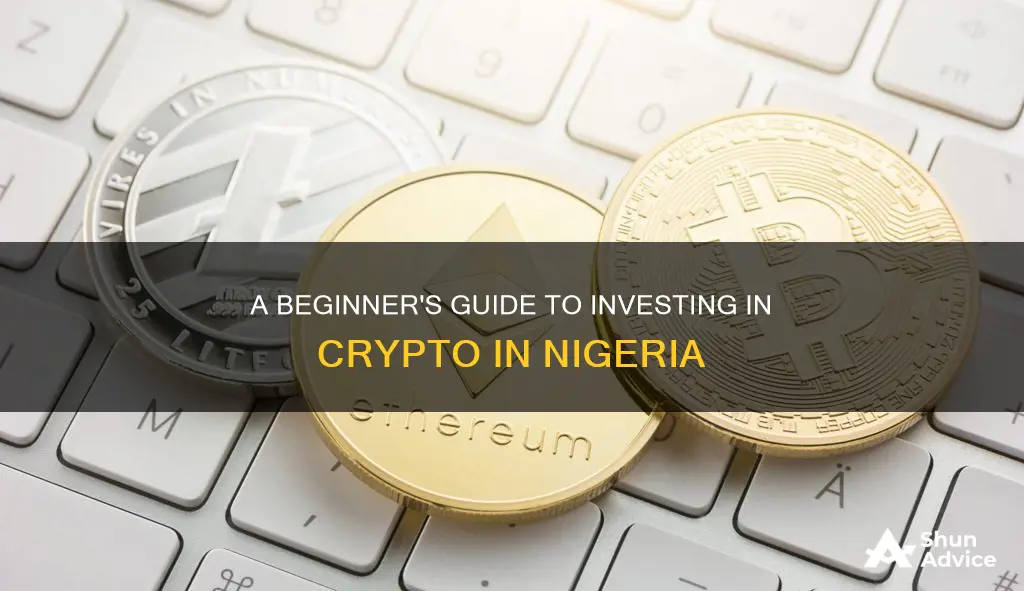
Nigeria is one of the major global users of cryptocurrencies. In 2020, 32% of participating Nigerians in an online survey used cryptocurrencies, with a total transaction volume of $400 million. Despite the Central Bank of Nigeria's refusal to process transactions involving crypto exchanges, Nigerians can still purchase cryptos. The first step is to get a crypto wallet, which can be an online wallet or a hardware wallet. Then, you can purchase cryptocurrencies through Bitcoin ATMs, peer-to-peer exchanges, crypto brokers, or crypto trading platforms. It is important to note that commercial banks in Nigeria have limitations on crypto transactions. This guide will explore the various options available to Nigerians for investing in cryptocurrencies.
| Characteristics | Values |
|---|---|
| Cryptocurrency use in Nigeria | One of the major global users of cryptocurrencies |
| Reasons for use | Failing national fiat currency, high remittance fees, and devaluation of the Naira |
| Crypto trading platforms in Nigeria | Quidax, Luno, Yellow Card, Coindirect |
| Cryptocurrencies popular in Nigeria | Bitcoin, Ethereum, XRP, Litecoin, Dash, Ripple, Tether, Bitcoin Cash |
| Crypto trading strategies | Dollar-cost averaging, scalping, day trading, arbitrage trading |
| Crypto wallet options | Online wallet, hardware wallet |
| Other options | Bitcoin ATMs, peer-to-peer exchanges, crypto brokers |
What You'll Learn

Choosing a cryptocurrency wallet
When choosing a cryptocurrency wallet, it is important to select one that suits your needs and risk tolerance. There are several types of wallets, each with its own advantages and security considerations. Here are some factors to consider when choosing a cryptocurrency wallet:
- Security and Backup Features: Look for a wallet with robust security and backup features, such as seed backup keys, pin codes, and multi-signature transactions. Ensure that the wallet has not been created with the sole intention of scamming people.
- Hot or Cold Wallet: Hot wallets are connected to the internet, making them convenient for frequent transactions and quick access to your funds. However, they are more vulnerable to hacking attempts and malware attacks. On the other hand, cold wallets remain offline, providing an extra layer of security against potential cyber threats. Cold wallets are ideal for storing large amounts of cryptocurrencies for the long term.
- Compatibility: Choose a wallet that is compatible with your operating system and different devices, such as desktop, mobile, or hardware wallets.
- Ease of Use: Opt for a wallet with an intuitive user interface that is easy to navigate and use for making transactions.
- Multi-Currency Support: If you plan to use multiple cryptocurrencies, select a multi-currency wallet that supports various currencies from a single platform.
- Customer Support: Consider a wallet that offers dedicated customer support to assist you with any issues or queries you may have.
- Control of Private Keys: Choose a non-custodial wallet where you own and control your private keys. This ensures maximum security and privacy.
- Additional Security Layers: Look for features such as two-factor authentication, complex passwords, and multi-signature transactions to add extra layers of security and protect your funds.
- Reputation and Reviews: Research the reputation of the wallet provider and read reviews from other users to gauge their level of satisfaction and identify any potential issues.
- Transaction Fees: While transaction fees are generally low, consider the fee structure of the wallet to avoid unexpected costs.
- User Experience: Evaluate the user experience of the wallet, including its interface, accessibility, and any additional features that enhance the overall user journey.
Remember, it is crucial to prioritise the security of your funds and personal information when choosing a cryptocurrency wallet. Always conduct thorough research and consider your specific needs before making a decision.
Protecting Your Bitcoin: Coinbase's Security Measures
You may want to see also

Using Bitcoin ATMs
Bitcoin ATMs are a great way to buy and sell Bitcoin in Nigeria, offering a straightforward and accessible method for consumers. In April 2020, Nigeria welcomed its first Bitcoin ATM, installed by Blockstale BTM in Dazey Lounge and Bar in Lagos state. This marked a significant milestone as Nigeria is Africa's largest economy and the continent's largest source of Bitcoin trading volume.
Blockstale BTM plans to expand its network with over 30 more terminals across Nigeria, demonstrating the growing demand for Bitcoin ATMs in the country. The company's chief executive and founder, Daniel Adekunle, acknowledged the legal uncertainties surrounding cryptocurrencies in Nigeria but also highlighted that Nigerians are the highest crypto traders in Africa.
Using a Bitcoin ATM in Nigeria offers several benefits. These ATMs provide an easy and convenient way to buy and sell Bitcoin, allowing users to transact directly with cash or bank transfers. They are designed to be user-friendly, making the process of buying and selling cryptocurrencies more accessible to the general public.
Additionally, Bitcoin ATMs can help users save money on transaction fees associated with traditional banking systems. This is particularly advantageous in Nigeria, where transferring money internationally can be costly. By using a Bitcoin ATM, users can bypass the traditional banking system and its associated fees, making it a more cost-effective option for those looking to invest in cryptocurrencies.
When using a Bitcoin ATM, it is important to keep in mind that there may be limits on the amount of Bitcoin you can buy or sell in a single transaction. Additionally, the fees associated with using a Bitcoin ATM may vary depending on the machine and your transaction amount. Therefore, it is always a good idea to research the specific ATM you plan to use and understand the fees and limits before initiating a transaction.
In summary, using Bitcoin ATMs in Nigeria offers a convenient and accessible way to invest in cryptocurrencies, particularly for those new to the market. With the increasing popularity of Bitcoin and other cryptocurrencies in the country, these ATMs provide a much-needed service, allowing users to bypass traditional banking systems and their associated fees. As the demand for cryptocurrencies continues to grow in Nigeria, the availability and usage of Bitcoin ATMs are likely to expand, making it an even more attractive option for investors.
Bitcoin's Early Investors: Unimaginable Wealth and Opportunities
You may want to see also

Peer-to-peer exchanges
Peer-to-peer (P2P) exchanges are a common way to buy and sell cryptocurrencies in Nigeria, with the country ranking first worldwide in P2P crypto trading volume. P2P exchanges involve two people: a seller and a buyer. The seller exchanges their cryptocurrency for a local currency (such as the Nigerian Naira) paid by the buyer on an exchange that provides P2P services.
Some popular P2P exchanges in Nigeria include:
- Bybit: Bybit is a cryptocurrency exchange founded in 2018. It offers a P2P platform with various payment methods, including bank transfers, PayPal, and Skrill. Bybit charges no maker or taker fees for fiat trading pairs.
- Remitano: Remitano is the most frequently used P2P exchange in Nigeria, with a customer base of over 1.5 million in more than 30 countries. It provides an escrowed P2P platform that connects buyers and sellers to negotiate prices. Remitano charges a 1% transaction fee.
- Binance: Binance is the world's top exchange in terms of liquidity. It offers a P2P platform with a wide range of payment options, including bank transfers, ChipperCash, and PayPal. Binance has introduced the Nigerian Naira (NGN) in its P2P platform, allowing users to send and receive NGN directly to and from another Binance user's NGN wallet.
- Paxful: Paxful is a US-based P2P exchange that supports up to 300 payment methods and serves about 2 million users. It only supports Bitcoin and charges no fees for buying, but sellers may be charged a percentage for selling Bitcoin, depending on the payment method.
- OpenPeer: OpenPeer is a decentralised P2P exchange that does not take custody of your funds. It uses a smart contract-based escrow system, allowing users to trade directly from their self-custody wallets. OpenPeer supports various cryptocurrencies and over 100 fiat currencies and payment methods. It charges no fees for buyers and a low 0.3% fee for sellers.
- OKX: OKX is a privately-owned company founded in 2014 and headquartered in Malta. It offers a P2P platform where Nigerian users can buy Bitcoin, Ethereum, and Tether (USDT) with the Nigerian Naira via bank transfer. OKX does not charge any fees for using its P2P feature.
- Bitvalve: Bitvalve is a P2P platform that offers multiple payment options and supports various cryptocurrencies. It secures users' funds and charges minimal fees, especially when using its native token (BTV) for payments.
- Coincola: Coincola is a Hong Kong-based exchange that entered the Nigerian market in 2019. It supports up to 14 payment methods, gift card exchanges for Bitcoin, and various cryptocurrencies. Its fees are listed on its website.
- InstaShift.io: InstaShift is an Estonian-registered P2P exchange founded by two Indian businessmen. It offers peer-to-peer exchange services, crypto transfers, deposit/wallet services, and the ability to flip between different cryptocurrencies. InstaShift supports up to 85 cryptocurrencies and charges trading fees ranging from 1% to 5%.
P2P exchanges offer benefits such as transparency, cost-effectiveness, privacy, security, and convenience. However, it is important to note that refunds may be difficult to obtain on these platforms, and there is a risk of account freezing if a payment is sent from a hacked bank account.
Algorand Coin: A Smart Investment Decision?
You may want to see also

Crypto brokers
There are several advantages to using a crypto broker. They offer an easy setup, as solo crypto trading is often associated with technical issues relating to the blockchain. Crypto brokers also allow you to conduct leveraging, which lets you borrow funds to increase your position. They also have more advanced technical instruments, such as a downloadable platform, mobile app, or website. The trading is faster, and the price of the crypto is often fairer.
However, there are also some disadvantages. Crypto brokers charge fees and commissions, which can be expensive. Additionally, an untrustworthy crypto broker could cause you to lose money.
- AvaTrade: User-friendly app, 20+ cryptos, low ETH trading costs
- Pepperstone: 28 cryptos to trade, 3 crypto indices, and a great range of platforms
- IC Markets: Best Cryptocurrency Broker for Beginners
- Eightcap: 100+ Crypto Pairs and Low Fees
- XM: 58 Cryptos, High Leverage, Excellent Education
- HFM: 40+ cryptos, low trading costs, 1:50 leverage
- FBS: 24/7 customer support, low ETH spreads, low min deposits
- Exness: High Leverage, Low-Cost Cent Account, Low Min Deposits
Dogecoin Investment: Worthwhile or Risky Move?
You may want to see also

Crypto trading platforms
It is important to note that not all crypto trading platforms accept Nigerian customers, so it is essential to do your research. Here are some popular crypto trading platforms in Nigeria:
Quidax
Quidax is a crypto trading platform that allows users to buy and sell various cryptocurrencies with ease. They offer a straightforward way to trade crypto and provide access to diverse markets with super-charged liquidity. Quidax also has its native token, QDX, which users can stake to earn free tokens.
Luno
Luno is a trusted and secure crypto trading platform that enables users to buy, sell, and trade cryptocurrencies such as Bitcoin, Ethereum, XRP, and Litecoin. It offers an easy three-step process to get started: signing up for a free Luno Wallet, choosing a preferred payment method, and then buying and storing the desired cryptocurrency. Luno has been in the industry since 2013 and has successfully processed over $8 billion in transactions.
Yellow Card
Yellow Card is a crypto trading platform that allows users to trade Bitcoin, USDT, and other cryptocurrencies with zero fees. It offers a secure and transparent platform, ensuring that third parties do not participate in transactions. Yellow Card also supports local currency, allowing users to fund their accounts with Naira. With over 1 million users, Yellow Card provides an active community for buying and selling cryptocurrencies.
Dogecoin Investment Guide for Filipinos: Getting Started
You may want to see also
Frequently asked questions
The pros are that the crypto market is highly volatile, and with great strategies, you can exploit the market to make a profit. There is transparency in the crypto market, and you are in total control of what to do with your money. You can also copy the trades of those who are successful with trading cryptocurrencies. The major disadvantage is that the market is highly volatile, and you can lose all your money at once. Some trading strategies take a lot of work; you must practice for a long time to learn how they work.
You will need a crypto wallet and a crypto exchange. You can sign up on the Yellow Card App and find practical cryptocurrency training at the YC Academy to get started. You will also need to know how to trade the cryptocurrency market in Nigeria, including the limitations on crypto transactions that commercial banks in Nigeria have.
Luno is Nigeria's most trusted, secure, and reliable Bitcoin exchange. Yellow Card is another good option as it offers zero fees for transactions and good security.







